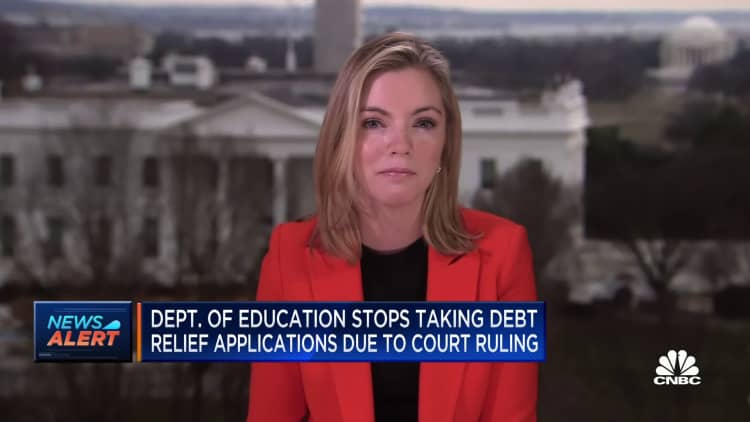The Biden administration filed a legal brief with the U.S. Supreme Court defending its plan to cancel hundreds of billions of dollars in student debt.
In its arguments to the highest court submitted late Wednesday, lawyers for the U.S. Department of Education and U.S. Department of Justice argued that the challenges to the plan were brought by parties that failed to show harm from the policy, which is typically a requirement to establish so-called legal standing.
The attorneys also denied the claim that the Biden administration was overstepping its authority, laying out the White House's argument that it is acting within the law. It points to the fact that the Heroes Act of 2003 grants the U.S. secretary of education the authority to waive regulations related to student loans during national emergencies.
More from Personal Finance:
Who fares worst if Supreme Court rules against student debt relief
Secure 2.0 bill on track to usher in retirement system improvements
New retirement legislation leaves a 'huge problem untouched'
The country has been operating under an emergency declaration due to Covid since March 2020.
"We remain confident in our legal authority to adopt this program that will ensure the financial harms caused by the pandemic don't drive borrowers into delinquency and default," U.S. Secretary of Education Miguel Cardona said in a statement.
The Supreme Court agreed to take the case on President Joe Biden's student loan forgiveness plan last month, and the justices will hear oral arguments on Feb. 28.
In the meantime, the Biden administration is blocked from carrying out its plan. Before it closed its application portal, around 26 million Americans applied for the relief.
Supreme Court to hear two challenges
Biden announced in August that tens of millions of Americans would be eligible for cancellation of their education debt — up to $20,000 if they received a Pell Grant in college, a type of aid available to low-income families, and up to $10,000 if they didn't.
Since then, Republicans and conservative groups have filed at least six lawsuits to try to kill the policy, arguing that the president doesn't have the power to cancel consumer debt without authorization from Congress and that the policy is harmful.
The Supreme Court has agreed to hear two of those legal challenges: One brought by six GOP-led states that argue that forgiveness will hurt the companies in their states that service federal student loans, and another involving two plaintiffs who say they've been harmed by the policy by the fact that they are partially or fully excluded from the loan forgiveness.

Higher education expert Mark Kantrowitz said the Biden administration made many strong arguments in its brief.
"The federal government does a very good job of demonstrating that the plaintiffs lack legal standing," Kantrowitz said.
Yet it's possible the justices will look beyond the issue of legal standing and consider the merits of the plaintiffs' arguments.
In that case, the president's plan would face low odds of survival, given the court's conservative majority, experts say.


